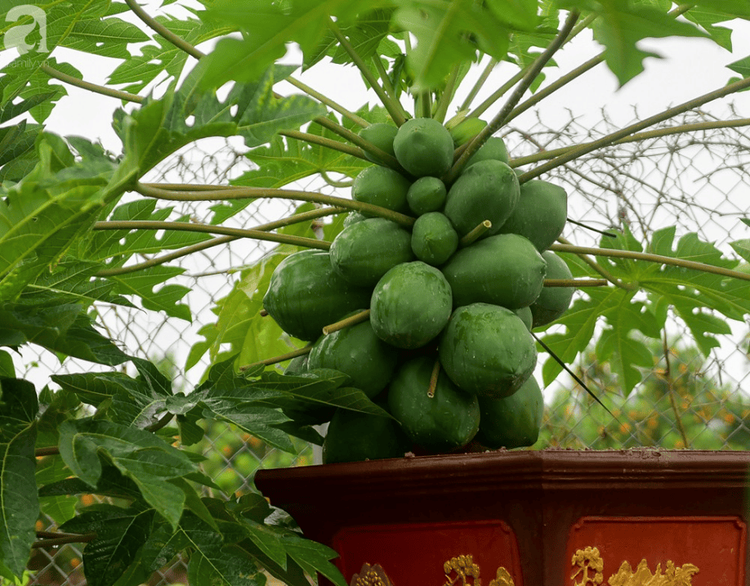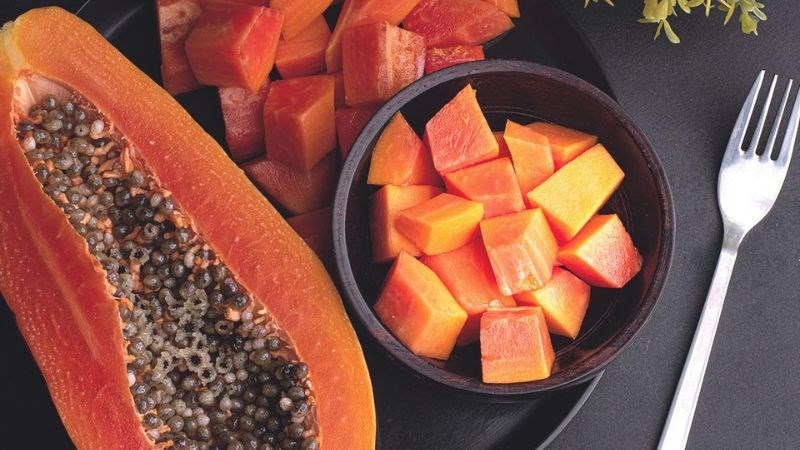Papaya is a familiar fruit, not only used as food, papaya is also used as a medicine. However, this “superfood” is not safe for everyone.
1. Nutritional composition of papaya
Papaya is considered one of the healthiest fruits, containing abundant nutrients. A small papaya (about 150g) can provide:
- Calories: 59
- Protein : 1g
- Carbohydrate :15g
- Fiber :3g
- Potassium: 11% of the daily nutritional requirement (RDI)
- Vitamin B9 : 14% RDI
- Vitamin A: 33% RDI
In addition, papaya also contains vitamins B1, B3, B5, K, E, carotenoids, papain enzyme, quercetin, flavonoids, zeaxanthin… In particular, papaya contains more beta carotene, a precursor of vitamin A, than in other fruits and vegetables.
When ripe, papaya contains 90% water, 13% sugar, no starch, many organic acids and antioxidant proteins, so it is good for the cardiovascular system and can prevent colon cancer.
2. People who should not eat a lot of papaya
2.1 Pregnant women

Pregnant women should not eat green papaya.
Papaya, especially green papaya, when eaten in excess can cause unwanted miscarriage. Raw papaya contains a lot of latex, which can trigger uterine contractions, which can lead to miscarriage. However, if you only eat a moderate amount of papaya, it may not cause any harm to your health. However, to ensure safety, pregnant women should not eat green papaya.
2.2 People with liver failure should not eat papaya
People with liver failure often have to use many types of medication. Papaya has the effect of helping to recover from toxic effects on the liver and reduce damage to this organ. However, some studies published on Healthline have also mentioned that papaya leaves can increase the concentration of GGT, ALP and bilirubin enzymes, which often indicate active liver disease due to bleeding and inflammation. Therefore, it is best for people with liver failure to avoid or reduce eating papaya. If you want to eat it, you should consult your doctor.
2.3 People with irregular heartbeat
People with irregular heartbeat may have their condition aggravated by eating papaya. One study found that papaya contains low levels of cyanogenic glycoside, an amino acid that can produce hydrogen cyanide in the human digestive system. Although small amounts of this compound are unlikely to be harmful to people with heart disease, eating too much can be harmful.
2.4 People with hypothyroidism
Cyanogenic glycosides in papaya not only affect the heart rate but can also interfere with the synthesis and metabolism of iodine in the body and cause more severe symptoms in people with hypothyroidism. However, this only happens in people who eat too much papaya.
2.5 People with allergies
People with respiratory disorders such as asthma, or any allergies, should be careful when eating papaya. Sometimes pollen can stick to the papaya skin, so when peeling papaya, wear gloves. Throw the skin and gloves in the trash immediately after peeling.
Papaya allergies often have the following symptoms: swelling of the mouth, itching around the face and throat, rash on the tongue, dizziness, headache, abdominal pain, difficulty breathing and difficulty swallowing.

Although papaya is a healthy food, people with allergies, kidney stones… should not eat too much papaya.
2.6 People with kidney stones
Papaya is rich in vitamin C, 100g of papaya contains 60.9mg of vitamin C. This is an antioxidant and plays an important role in maintaining a strong immune system. However, too much vitamin C can lead to the formation of calcium oxalate kidney stones or worsen symptoms in people who already have the disease.
2.7 People with poor digestion
Papaya is an excellent laxative and a rich source of fiber, which is very good for digestive health. However, eating too much can have a negative impact on the stomach. At this time, instead of treating stomach problems such as constipation and indigestion, it can lead to diarrhea and bloating.
2.8 People with hypoglycemia
People with hypoglycemia or low blood sugar should avoid eating papaya. Because eating too much can lead to symptoms such as tremors and rapid heartbeat.





